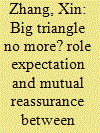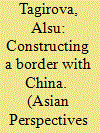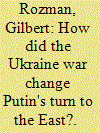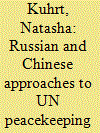|
|
|
Sort Order |
|
|
|
Items / Page
|
|
|
|
|
|
|
| Srl | Item |
| 1 |
ID:
192958


|
|
|
|
|
| Summary/Abstract |
After decades of international cooperative strategies based on soft power through Official Development Assistance (ODA), the environmental, socioeconomic, and political change in the circumpolar North has led Japan to develop and link its Arctic policy with its Oceanic policy. To respond to the rising influence of China in the geopolitical and geoeconomic scene, Japan's maritime policy is based on international peace and stability, freedom of navigation, and the support of the international legal framework. Beyond its regional sphere of interest and influence, the inclusion of the Arctic region in Japan's Oceanic policy is also strongly connected to the influence of think tanks, lobbies, and institutions in Japan's policies, that for decades have encouraged Tokyo to take proactive measures. This policy also illustrates the ambition to present a comprehensive panoramic strategy embracing not only seas and oceans directly surrounding Japan, but worldwide.
|
|
|
|
|
|
|
|
|
|
|
|
|
|
|
|
| 2 |
ID:
192957


|
|
|
|
|
| Summary/Abstract |
I examine how mutual perception and role expectation evolve over time between China and Russia on each other's position in the international system and on bilateral relations in the context of shifting perceptions of the "Big Triangle" between the United States, Russia, and China since the late 1990s. Building on Role Theory in international relations, I use official texts, and experts' opinions during a series of key policy episodes to demonstrate that constantly adjusting role expectations and role enactment has become an important part of official Sino-Russian inter-state relations. Such relations have evolved from a more conservative, mutual role expectation of "do-no-harm" to more proactive expectations of joint efforts and policy coordination. This changing role expectation comes along with mutual reassurance against role mismanagement when both seek to substantiate the role of "significant others" beyond traditional military allies. During the 2010s, Sino-Russian bilateral relations started to be increasingly shaped by a discussion about the salience of US-China-Russia "Big Triangle."
|
|
|
|
|
|
|
|
|
|
|
|
|
|
|
|
| 3 |
ID:
192954


|
|
|
|
|
| Summary/Abstract |
The Russian and Soviet governments believed the border to be a social and political construct. They often described and considered it as a foreign policy issue and a point of military vulnerability. In the course of 70 years of Sino-Russian relations since 1949, the border turned from a porous imperial fringe to a line of defense, a zone of economic growth, and a zone of economic anxiety. Throughout this evolution process, the Russian central government failed to grant agency to the local authorities and indigenous communities. The article argues that the current Russian federal government entrusts the local government with two conflicting goals in the borderlands: building strong cross-border ties and maintaining a "strong vertical of power" with top-down management and absolute supremacy of national security matters.
|
|
|
|
|
|
|
|
|
|
|
|
|
|
|
|
| 4 |
ID:
192955


|
|
|
|
|
| Summary/Abstract |
Observers tend to interpret the contemporary Sino-Russian relationship in terms of strategic, purposeful cooperation driven by national interests and power-political considerations. The search for power and security, as well as balancing against the United States, have increasingly been pushing China and Russia closer together. The energy realm offers a distinct picture of the Sino-Russian relationship. The pace of cooperation has varied and depended on key domestic players in particular sectors. As a consequence, success stories have been accompanied by major setbacks. Energy cooperation encompasses both a meteoric rise of oil cooperation and the muddling through of gas cooperation. The foundations for close ties in the energy realm were laid well before the post-Crimean acceleration of Sino-Russian cooperation. More often than not, however, parochial interests of dominant state-owned and private enterprises rather than strategic considerations have driven this cooperation. Looking through the prism of energy cooperation, I emphasize the complexity of Russia and China as actors in international politics instead of approaching them as rational and unitary players.
|
|
|
|
|
|
|
|
|
|
|
|
|
|
|
|
| 5 |
ID:
192953


|
|
|
|
|
| Summary/Abstract |
Expectations that the Ukraine war would revitalize Vladimir Putin's "Turn to the East" were not realized. He had sought to link Ukraine and Taiwan in a struggle for a new order. If Xi Jinping's "Beijing straddle" countered the Washington-led international order, it mostly complied with Western sanctions. Russia had claimed to be the coequal driver of the reordering of the East, but a war presumed to raise its stature in China had the opposite effect. The "Turn to the East" shifted further to a "turn toward China," and Xi determines the timing of the East-West confrontation. The war, coupled with anger over the victory of Yoon Suk-yeol, tilted Moscow further to North Korea over South Korea. Japan finally pulled the plug on Shinzo Abe's legacy of wooing Putin. Russia's turn to China played poorly in India, too, although it clung to cooperation in part to restrain a further shift. Even Russian hopes for ASEAN were set back. The war's impact in the East defied Putin's intentions.
|
|
|
|
|
|
|
|
|
|
|
|
|
|
|
|
| 6 |
ID:
192956


|
|
|
|
|
| Summary/Abstract |
The Sino-Russian strategic partnership, among its many facets, includes broad alignment in the United Nations Security Council (UNSC) on issues of intervention, and their similar (if not identical) stances on the controversial Responsibility to Protect (R2P) doctrine in regard to Darfur, Libya, or Syria are well known—but the Libyan R2P-inspired enforcement action (intervention absent the consent of the host state) is relatively rare. Less work has been carried out on Russian and Chinese discourse on UN peacekeeping, viz consent-based operations. We fill a gap by examining and comparing their discourse on UN peacekeeping in UN Security Council meetings, demonstrating that their converging views have begun to seep into the previously 'safe space' of peacekeeping. The controversy surrounding the 'protection of civilians' encapsulated in the Libyan resolution 1973, which was used for regime change, caused concern for Russia and China. New directions in UN peacekeeping—in particular, stabilization missions—which emphasize the protection of civilians, are testing UN peacekeeping doctrine. A comparison of Chinese and Russian voting patterns in the UNSC reveals a fairly similar line taken on voting to extend peacekeeping mandates, yet upon examining the discourse in UNSC meetings regarding three UN stabilization missions between 2011 and 2022, as well as more generic meetings on peacekeeping, subtle differences emerge, which reflect differences in Russian and Chinese narrated global identities and status concerns. These differences show that alignment is based more on converging interests than converging values.
|
|
|
|
|
|
|
|
|
|
|
|
|
|
|
|
|
|
|
|
|